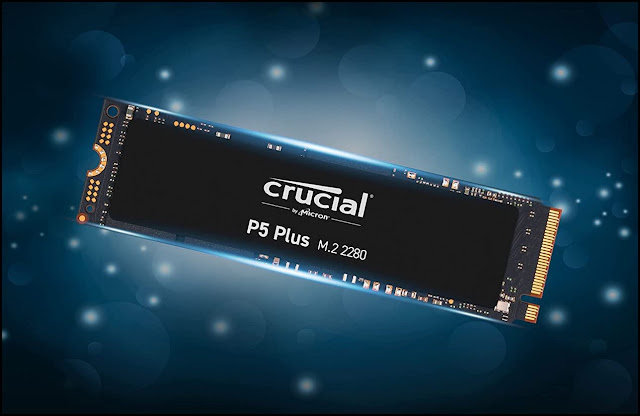When it comes to releasing high-performance NVMe solid-state drives, Crucial has been unexpectedly slow. The new Crucial P5 Plus, which we tested in a 1TB configuration, makes almost no difference. So it's unlikely to appear on any of the best SSD for gaming lists, but it does come at an enticing price.
The first M.2 SSDs with PCIe Gen 4 connectors arrived almost two years ago. Crucial, on the other hand, is only now catching up with its own rival. Of course, Intel's Rocket Lake desktop platform, which is capable of PCIe 4.0, was only recently announced. Even now, only a tiny percentage of current PCs are Gen 4 capable, and many new desktops are still being marketed without compatibility.
Crucial, on the other hand, is in the business of mass-producing mainstream drives. As a result, it was probably prudent to wait until the ecosystem was in good working order before introducing any new technologies. Crucial, it turns out, is also in the business of developing its own SSD technology from the ground up. Micron's retail brand, of course, is critical. Micron is one of the world's leading semiconductor producers.
The Crucial P5 Plus is therefore more than simply the company's first PCIe Gen 4 drive. Micron's newest TLC (triple-level-cell) flash memory is also included. The new 176-layer NAND chips are reported to offer a significant improvement over Micron's previous 96-layer memory. They're said to have shorter latency, higher throughput, and increased durability. In other words, it's better on almost every parameter.
Crucial's new PCIe Gen 4 controller chip is less well-known. Its predecessor, the Gen 3 model, was a six-core machine, and that may be the case here as well. On this 1TB drive, all we know for sure is that it has eight memory channels and connects to 1GB of DDR4 cache. For the record, the 500GB model receives the same amount of cache as the 2TB disc, which has 2GB.
Hardware-based AES 256-bit encryption and the mandatory SLC cache mode, which allows a section of the drive to be dynamically assigned to run in faster single-level-cell mode, are also enabled by the updated controller. Overall, Crucial claims that the 1TB P5 Plus is capable of peak read speeds of 6,600MB/s and write speeds of 5,000MB/s. On paper, it puts it below the Sabrent Rocket 4 Plus and Adata XPG Gammix S70, which are among the fastest PCIe Gen 4 SSDs. However, we're still talking about theoretical bandwidth of GB/s.
The promises made by Crucial regarding random access performance are adequate, but not nearly class-leading. The Crucial 1TB P5 Plus has a read IOPS rating of 630,000 and a write IOPS rating of 700,000. To put things in perspective, the Samsung 980 Pro has one million IOPS in both ways, while the WD Black SN850 has one million read IOPS and 710,000 write IOPS.
Write endurance for this 1TB model of 600TB rounds out the necessary speeds and feeds, which should be plenty for all save the most demanding users. The drive comes with a five-year guarantee from Crucial, which should cover most installation scenarios. Acronis Cloning is included in the software package, in addition to Crucial's own drive-management programme, which is useful if you're transferring an old OS to a new drive.
In terms of how this drive really performs, it's certainly good for the advertised peak sequentials, with writes consistently over 5,000MB/s in CrystalDiskMark and reads significantly exceeding 6,800MB/s. The small queue depth 4K random numbers are a little less exciting. The reads on the QD1 are only 69MB/s, whereas the writes are 174MB/s. These aren't disastrous outcomes. However, the WD Black SN850, for example, delivers roughly 90MB/s and 315MB/s, respectively, and every other PCIe 4.0 drive we've tested is at least a bit faster.
Synthetics like that, of course, only reveal part of the tale. The Crucial P5 Plus scores 3,140 points in PC Mark's Full Storage Index, which is one of the greatest results we've seen. The P5 Plus, on the other hand, did not do well in the Final Fantasy XIV: Shadowbringers level load test.
The linked subjects of long-term sustained performance and thermals are where there is a bigger question mark. During our internal file copy test, we discovered that performance began to deteriorate at about 300GB of writes, which is likely due to the amount of the dynamically allocated SLC cache. However, after 200GB/s, there was a brief glitch, which might have been due to thermal throttling. The P5 Plus reached 69°C during our tests, which is rather warm. While this isn't an overheated disaster of an SSD, it does appear to be lacking in cooling. As a result, we wouldn't put our faith in its thermal performance as the drive matures. It's unlikely to improve with use, to be sure.
Overall, the Crucial P5 Plus is reasonably priced for a PCIe Gen 4 drive with high-quality TLC flash memory rather than low-cost QLC flash memory, beating most if not all of the competition—and by a significant margin when compared to the most expensive drives like the WD Black. If we were very price-sensitive at the time, we'd definitely swallow our little worries about operating temperatures and IOPS performance. A powerful 1TB drive like this would provide a great overall computing experience while also providing adequate capacity for a respectable collection of beloved games, leaving just less-used games on a clumsy old magnetic drive or possibly a discarded SSD. That'll do it.




0 Comments